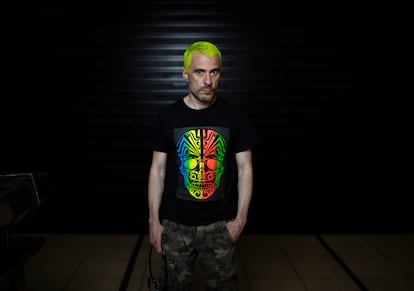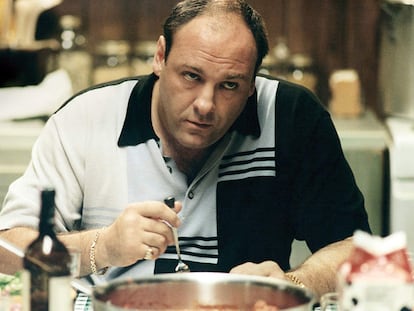Silk Road’s Doctor X: ‘It is easier to get cocaine than an antibiotic’
Specializing in harm reduction, Fernando Caudevilla was involved in the closure of the so-called Amazon of drugs. His story is now being told in a new book


In the morning, Fernando Caudevilla, 50, works as a family doctor in a normal health center in Spain. In the afternoon, like a superhero, he transforms into Doctor X, a doctor specializing in drugs. He works in his private practice (in addictions, therapeutic uses of drugs, chemsex, drug information, risk prevention), does research and gives talks. For 20 years, he was part of Energy Control, an organization dedicated to drug testing and providing information in entertainment venues such as nightclubs or festivals.
Now he is the star of the book Doctor X. El médico de la Dark Web (Doctor X. The Dark Web’s MD) by José Ángel Mañas and Jordi Ledesma. In this fast-paced, meta-literary novel, the writers delve into Silk Road, the drug sales page on the deep web, whose founder, Ross Ulbricht, was sentenced to two life sentences. Doctor X was, in some way, involved.
Question. What was Silk Road?
Answer. It was the first “Amazon of drugs,” thanks to the anonymity of bitcoin and the deep web. It worked extraordinarily well. When they told me about it, I didn’t believe it, and when I looked at it, I was amazed. It had a forum where different topics were discussed. My participation there was the same as in my professional career: answering questions and providing information about drugs.
Q. You took part under the nickname Doctor X.
A. Yes, but in a completely identifiable and transparent way, putting the link to my website. And I was very successful. So Dread Pirate Roberts [the nickname of the creator of Silk Road] offered me $500 a week in bitcoin. When bitcoins were worth the same as a unicorn.
Q. Ross Ulbricht was sentenced to two life sentences.
A. And the following week, Silk Road 2.0 started, as if nothing had happened... Between 2007, when Ross was arrested, and 2015, I continued doing that work in the drug markets. Then they found him guilty, and gave him an exemplary sentence, although all he had done was program. They tried to frame him for several murders, but it didn’t work out. Then they decided to include testimonies from parents who had lost their children to drugs.
Q. That’s when you come in again.
A. Yes, they contact me and other international experts. They tell me to go testify in New York, but here [in Spain] they advise me not to go. So I testify in writing. I explain everything about my relationship with Ross and my presence on Silk Road. I provided my 600 messages with him.
Q. Did it have an impact?
A. Suddenly I was in The New York Times, in USA Today, a friend told me I was on Oprah Winfrey’s show. And it was true. Here, luckily, no one found out. Which makes me infinitely happy.
Q. Why?
A. The judge said a series of outrageous things... She called me despicable, irresponsible... Of the 60 pages of the sentence, eight are dedicated to slandering me. Saying, for example, that I tried to sell fentanyl on the deep web. For me, the main reason for this novel is the appendix where I explain myself on this subject. On the bright side, I started to be called at world congresses, then I worked with the European Union, my work has been valued. Even if the judge thought it was very bad.

Q. It’s said that Spain is permissive when it comes to drugs.
A. Here, 400,000 citizens are fined a year for carrying drugs in their pockets. It is considered a serious violation of public safety: the same as displaying a weapon. The minimum fine is €600 [$646], when the minimum salary is €1,000 [$1.080]. But in relation to the global context, we are ok: in 70% of the countries in the world you can go to jail for carrying drugs. And the media is always reporting on needle attacks in nightclubs, cannibal drugs and other lurid stories; meanwhile, no one cares about the serious problems.
Q. Were you afraid of ending up in a prison in the United States?
A. Yes, in the novel, this is a bit exaggerated, but yes I was. Eight people appear in the trial papers, myself among them, and six ended up in jail. I guess it was considered that giving information about drugs is not a crime. But it was an intensely unpleasant thing, there were moments of panic. I’m not paranoid at all, but I had a constant feeling that I was being watched and listened to.
Q. It is understandable, given the conviction against Ulbricht.
A. And it was useless, because the drug cryptomarkets continue. It is just as useless as the drug policies we have. They are immoral policies, contrary to public health, that do much more harm than good. But we continue at the same thing.
Q. What is the impact of these policies?
A. That we do not know what we consume. The average consumer is usually looking for something or other in a nightclub at 3 a.m. Or they buy it from a guy on a street corner who gives them something and they don’t even know what’s in it. Take this, try this. It’s madness.
Q. Today, freedom and individual responsibility are valued, but in this case...
A. It is entrenched, it is the last taboo. It is okay to say that on Saturday you got really drunk, but not that you have a hangover because you took an ecstasy pill. In my case, most of my patients at the health center do not know about my activity as Doctor X. The 21st century is very funny: one can be very well known in a very small environment and then be a completely anonymous citizen. Some are amazed by the book, like my family. I had appeared in the press many times before with my most technical work, but not with this specific story.
Q. Has fentanyl reached Spain?
A. I’m glad you asked me that question, because it’s one of my eternal frustrations. In 2015, we started with international substance screening. In 2019, we get news that European dealers are selling heroin with fentanyl. We put out a report, which ended up at the United Nations. We contacted the sellers in the deep web and managed to stop it. It has not been seen again in Europe, fortunately.
Q. Why?
A. Here the supply of heroin, from Afghanistan, is greater than the demand, so there is no need for fentanyl, which, remember, is not a desired drug, but was originally used to adulterate heroin. And those adulterations are not necessary.
Q. In other places, the situation is not so positive.
A. Something is going wrong if drug policies fail to eradicate heroin, and it is seen to be adulterated with fentanyl, which in the United States is once again the leading cause of death in young people. The authorities are responsible for this.
Q. Is responsible consumption of all types of drugs possible?
A. The best way to avoid breaking your leg skiing is not to ski. Within sports, there are higher and lower risk sports. The same with drugs. One fentanyl pinhead makes you sick, two kills you. The substance that most kills and creates addiction, however, is tobacco. I believe that the more dangerous a drug is, the greater the reasons for it to be regulated, controlled. There are many ways to do it, leaving it in the hands of drug traffickers is not one of them.
Q. Alcohol and tobacco are very harmful and, being legal, are very widespread. If we legalize other drugs...
A. Eradicating tobacco among young people, which is one of the few things that is being achieved in Europe, has to do with regulation. Drugs have a dark side, but also a positive and recreational side. Alcohol is the great social lubricant in this country, but it also creates addiction and triggers problems of violence. Legalizing makes it sound like an open bar, but it is not: it is regulation. It couldn’t be worse than the open bar that exists now: it is easier to get cocaine than an antibiotic. In the pandemic there were problems with toilet paper… but not with drug supplies.
Q. What can be done?
A. I insist that the best way to avoid problems with drugs is not to use them. But the fact is that there are people who use them, and we have to look for strategies so that they know how to do it. There are ways to manage the different substances in terms of frequency, doses, effects. The problems tend to occur when you approach drugs without information, when a stranger gives you something like, “Here, you’ll like this.”
Sign up for our weekly newsletter to get more English-language news coverage from EL PAÍS USA Edition









































